PDF chapter test TRY NOW
The lesson "A Truly Beautiful Mind" is about a young German civil servant named Albert Einstein who took the world by storm over a century ago.
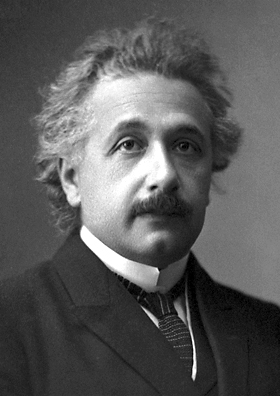
Albert Einstein*
Albert Einstein was born on March \(14\), \(1879\). He was born in Ulm. Ulm is a city in the German state of Baden-Wurttemberg. "Albert was the first son of Hermann and Pauline Koch Einstein" (*M. L., Pg. 12).
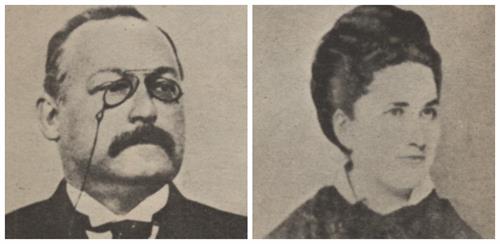
Hermann* and Pauline Koch Einstein*
While Einstein was a child, no one could have predicted that he would become a world-renowned scientist one day. On the other hand, Albert's mother considered him "weird" because he did not act, speak, think or look like other children. In comparison to other children of his age, Albert's behaviour seemed unusual. Einstein appeared to be less intelligent than others.
Later, Albert's mother believed that her son's head was larger than other children's heads. The reason behind the statement was that Einstein looked fatter when he was a newborn baby, and the backside of his head appeared to be overly broad. After seeing him, Einstein's mother thought that he was unusual.
Albert Einstein did not utter a single word till he was two-and-a-half years old. While he began to speak, he spoke everything twice. “Before saying the words louder, he would rehearse anything he intended to say to himself a few times. His slow mannerism of speaking made people believe that he was not at all a bright kid” (*M. L., Pg. 14).
For instance, a notable historian of ancient mathematics named Otto Neugebauer narrated the story of boy Einstein. He described Einstein as a “legend,” which looks reasonably accurate while reading about his childhood. ‘Einstein’s parents were concerned about his behaviour. So they took him to several doctors to understand what was wrong with him. On the other hand, the doctors couldn't predict anything wrong with Albert (*M. L., Pg. 12). He appeared to be a normal kid. On one night, while they were having supper, the boy exclaimed, “The soup is too hot.” His parents were astonished by this, and they inquired why he did not speak a single word earlier. At that moment, the boy responded that everything had been going smoothly until that point. The boy remained silent because everything was going well, and he didn’t want to complain about anything. “It shows significantly how intelligent little Albert had been” (*M. L., Pg. 14).
Einstein did not know what to play with the other children, so he continued silent. As a result of it, his playmates called him using the nickname "Brother Boring". They used the nickname because he would not play with them. Einstein liked the company of himself. From his childhood, Einstein enjoyed playing with mechanical toys, such as automated cars and planes.
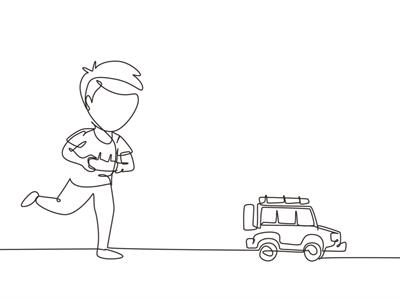
Albert used to play with automated cars
“One day Albert’s parents had told him that they would bring home a new toy. While they came, they brought a newborn baby named Maja” (*M. L., Pg. 14). Maja was Einstein’s younger sister. After seeing the baby, Albert wondered and asked his parents about her wheels. Usually, babies did not have wheels; they had legs. The statement was made because the baby seemed like a toy for him, so he might have asked his parents where her wheels were.
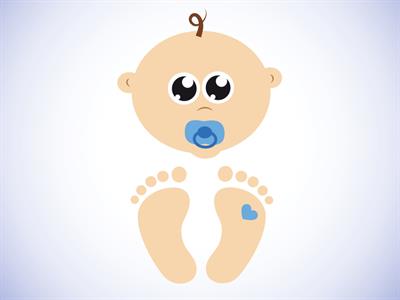
A newborn baby
Einstein's headmaster once told his father that Einstein would never be successful in whatever profession he chose. On the contrary to his master’s statement, Einstein excelled in playing the violin. Einstein began to play the violin at the age of six because his mother wanted him to do it. Despite being a scientist by profession, he maintained the skill throughout his life. Moreover, the headmaster’s statement is ironic because not just he became a “gifted amateur violinist” but also one of the greatest scientists of all time.
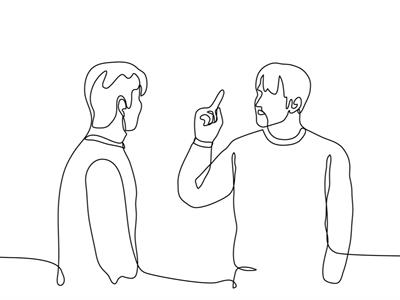
Headmaster speaking to Einstein's father
Albert Einstein was not a poor performer in academics. Albert attended high school in Munich, where his family had relocated when he was fifteen months old. His parents had shifted from Ulm (the city in Baden-Wurttemberg) to Munich (the capital and most populous city of Bavaria, Germany). While he was studying in high school, he scored good marks in almost every subject.
Albert Einstein was not a poor performer in academics. Albert attended high school in Munich, where his family had relocated when he was fifteen months old. His parents had shifted from Ulm (the city in Baden-Wurttemberg) to Munich (the capital and most populous city of Bavaria, Germany). While he was studying in high school, he scored good marks in almost every subject.
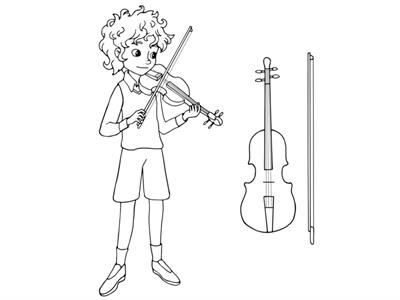
A boy playing the violin
'Albert enjoyed elementary school since his teachers did their best to respond to all of his questions. They were friendly and patient' (*M. L., Pg. 18). But things got complicated when Einstein turned ten. The school in Munich (The Luitpold Gymnasium) was very strict, and he never liked it. Due to his dislike, he often clashed with his teacher's opinions and opposed them. The students wore uniforms and marched from one class to another like soldiers" (*M. L., Pg. 18). This had always made Albert extremely uncomfortable. He was dissatisfied with the subjects that his teachers were teaching him. His curious and quick mind had questions that no one could reasonably answer. However, the questions were not allowed at all. He was not even expected to think. Since that had never been Albert's style, he did not enjoy it at school.
Einstein struggled a lot in his high school because he could not cope with the strict discipline, so he left the school forever at the age of \(15\). When he left the school, he felt relieved and thought that it was his right decision. Before Einstein quit school, the previous year, his parents had moved to another city – Milan, which is in Italy. Albert was left behind in Munich with his relatives. After having a long discussion with his family and relatives, the boy's parents agreed to put him in a school in Switzerland. The school he studied in Switzerland was Cantonal high school. The language used there in the school for communication was German. Einstein also desired to continue his education in German-speaking Switzerland as the city was more liberal than the city of Munich.
'Albert enjoyed elementary school since his teachers did their best to respond to all of his questions. They were friendly and patient' (*M. L., Pg. 18). But things got complicated when Einstein turned ten. The school in Munich (The Luitpold Gymnasium) was very strict, and he never liked it. Due to his dislike, he often clashed with his teacher's opinions and opposed them. The students wore uniforms and marched from one class to another like soldiers" (*M. L., Pg. 18). This had always made Albert extremely uncomfortable. He was dissatisfied with the subjects that his teachers were teaching him. His curious and quick mind had questions that no one could reasonably answer. However, the questions were not allowed at all. He was not even expected to think. Since that had never been Albert's style, he did not enjoy it at school.
Einstein struggled a lot in his high school because he could not cope with the strict discipline, so he left the school forever at the age of \(15\). When he left the school, he felt relieved and thought that it was his right decision. Before Einstein quit school, the previous year, his parents had moved to another city – Milan, which is in Italy. Albert was left behind in Munich with his relatives. After having a long discussion with his family and relatives, the boy's parents agreed to put him in a school in Switzerland. The school he studied in Switzerland was Cantonal high school. The language used there in the school for communication was German. Einstein also desired to continue his education in German-speaking Switzerland as the city was more liberal than the city of Munich.
Einstein was good at studies, and he was highly talented in solving problematic sums in Mathematics. He also had a particular interest in physics. After graduating from high school, Einstein enrolled at the University of Zurich (Switzerland). The handsome young man with the walrus moustache (a large bushy moustache resembling that of a walrus) was not only fascinated by science, but he had an interest in one of his fellow students, called Mileva Maric. He thought of her as a “clever creature” because she was a person of extraordinary intelligence and talent.
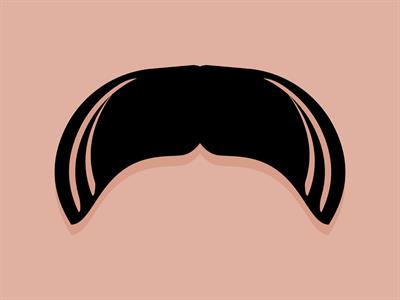
Walrus moustache
Mileva Maric and Albert Einstein met at the University of Zurich. She was referred to as a young Serb because she was from Serbia. She came to Switzerland since Zurich University was one of the few universities in Europe that provided education to female students. Mileva Maric broke out the traditions of academic institutions across Europe. She came forward to study in the polytechnic college. “She was considered the only woman in the class. She was pretty unique since not many women went to college at that time, and even fewer studied science or maths” ( *M. L., Pg. 26). Women did not go for higher education because the educational institutions never accepted them as candidates. Moreover, society had taught them that they were under the control of men, and their major duties were to bear children, take care of their family, and do household chores.
Mileva Maric and Albert Einstein met at the University of Zurich. She was referred to as a young Serb because she was from Serbia. She came to Switzerland since Zurich University was one of the few universities in Europe that provided education to female students. Mileva Maric broke out the traditions of academic institutions across Europe. She came forward to study in the polytechnic college. “She was considered the only woman in the class. She was pretty unique since not many women went to college at that time, and even fewer studied science or maths” ( *M. L., Pg. 26). Women did not go for higher education because the educational institutions never accepted them as candidates. Moreover, society had taught them that they were under the control of men, and their major duties were to bear children, take care of their family, and do household chores.
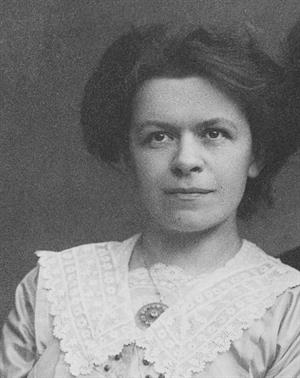
Mileva Maric*
Mileva was Einstein’s friend because she shared his interests in science, music and art. However, many people from the university and some from his family never shared his interest. Hence, Einstein considered Mileva as a friend against such “philistines”. Here, the word "philistines” refers to people who refuse to see the beauty or the value of art or culture.
Later, Albert Einstein and Mileva Maric fell in love with each other. They interchanged love letters to express their feelings. In the letters, they used to mix science with their feelings. In one instance, Einstein discussed his scientific innovation and stated that he would be pretty proud on the day when their work on "relativity” was finally completed. Relativity is a theorem formulated by Albert Einstein, which states that space and time are relative, and all motion must be relative to a frame of reference. It is a notion that states, laws of physics are the same everywhere. Einstein graduated from the University in \(1900\) when he was twenty-one years old. After his graduation, Einstein remained jobless till a year.
For a few days, Albert Einstein worked as a Teaching Assistant and also conducted private tuitions. 'His teachers refused to recommend him as a professor because they thought him a "wiseass" (a person who irritates others by pretending to be knowing everything) rather than a genius' (*M. L., Pg. 30). So he could not continue his career. As a result, he had a difficult time finding work to support his future goals. Meanwhile, he received help from a friend named Marcel. Marcel’s father was friendly with a patent office director, and he recommended a job for Einstein. 'A patent is a document issued by the government that allows an inventor to create and sell an invention while preventing others from copying it (*M. L., Pg. 30).
Finally, in \(1902\), Einstein got a job as a Technical Officer in a patent’s office in Bern (Germany). ‘Einstein’s work consisted of examining other people’s innovations and identifying flaws in their arguments’ (*M. L., Pg. 30). At the time, Einstein was quietly working on his theories. He’d have plenty of time to concentrate on his projects while working at the patent office. Einstein was known to have humorously referred to his "desk drawer" as the "bureau of theoretical physics" because he stored his secretly developed papers in the drawer. If anyone came close to his desk, he would push his papers aside and pretend to be working on patents.
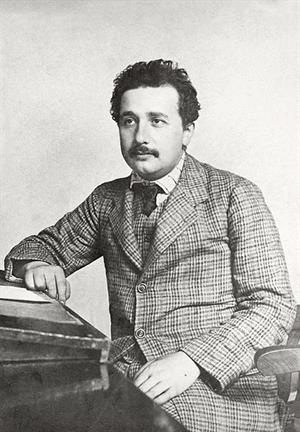
Einstein as a Technical Officer in a patent office*
Einstein published one of his renowned papers called "Einstein's Special Theory of Relativity" in \(1905\). The theory brought revolutionary thought to the scientific world. According to the theory, the measurement of time and distance were not accurate; it depended on something else. When two perfectly accurate clocks come together after a journey, and one of them has been travelling very fast compared to the other, they will not continue to indicate the same time. This led to the development of the world's most famous formula for explaining the relationship between mass and energy.
The theory of relativity gave us the basic formula of physics "E = mc²". E stands for energy, m for the mass of the object and c for the speed of the light in a vacuum. The speed of light in a vacuum is almost 300,000 km/s. To put it into simpler words, Einstein gave an example for relativity. He says that sitting with a nice girl for two hours feels like two minutes and that sitting on a hot stove for two minutes feels like two hours.
Though he was solving the complicated sums in physics for the world, his personal life started becoming problematic. He began to fail in his own life. Albert Einstein thought of marrying Mileva Maric soon after finishing his studies. But his mother, Pauline Einstein, was against their marriage. Pauline thought of stopping the marriage for two reasons. At first, she thought that Mileva Maric, three years elder to Albert Einstein, was very old than him or too much matured than him. Then she was afraid of Mileva's intelligence, and she told Einstein that Mileva was similar to him and was like a book. As his mother was against it, he stopped his wedding with Mileva.
The theory of relativity gave us the basic formula of physics "E = mc²". E stands for energy, m for the mass of the object and c for the speed of the light in a vacuum. The speed of light in a vacuum is almost 300,000 km/s. To put it into simpler words, Einstein gave an example for relativity. He says that sitting with a nice girl for two hours feels like two minutes and that sitting on a hot stove for two minutes feels like two hours.
Though he was solving the complicated sums in physics for the world, his personal life started becoming problematic. He began to fail in his own life. Albert Einstein thought of marrying Mileva Maric soon after finishing his studies. But his mother, Pauline Einstein, was against their marriage. Pauline thought of stopping the marriage for two reasons. At first, she thought that Mileva Maric, three years elder to Albert Einstein, was very old than him or too much matured than him. Then she was afraid of Mileva's intelligence, and she told Einstein that Mileva was similar to him and was like a book. As his mother was against it, he stopped his wedding with Mileva.
After becoming financially stable, Einstein married Mileva Maric in January \(1903\) and had two sons. It was a beautiful and blissful period for them at the start of their marriage. However, as years passed, their marriage became weak. Mileva Maric was talented, but she started losing her intellectual ambition and became a miserable housewife. Mileva was unhappy with her marriage, and she could not achieve her career dreams, so, finally, in \(1919\), both separated after prolonged fighting. Also, the major reason for their separation was Einstein’s relationship with his cousin Elsa.
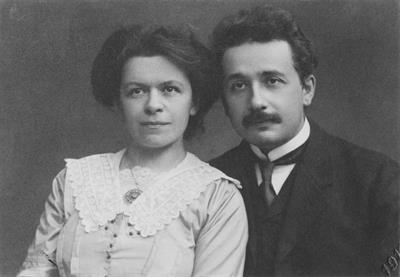
Einstein married Mileva Maric*
After the mutual divorce with his first wife, Einstein married his cousin Elsa Lowenthal in the same year. Elsa was the divorced mother of two children.
After the mutual divorce with his first wife, Einstein married his cousin Elsa Lowenthal in the same year. Elsa was the divorced mother of two children.
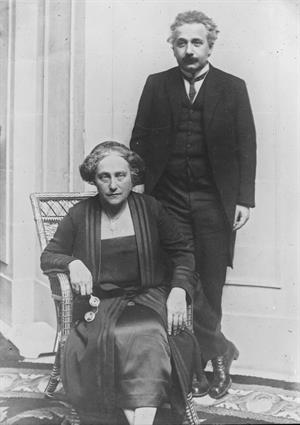
Albert and Elsa*
Einstein new theory had brought him worldwide recognition. He published “General Theory of Relativity” in \(1915\), which gave a new interpretation of gravity. A solar eclipse in \(1919\) proved his general theory of gravity was correct. A solar eclipse occurs when the moon passes in front of the sun, blocking it out partially or wholly.
In \(1915\), Albert Einstein had calculated and predicted that a solar eclipse would occur in \(1919\). As per his predictions, a solar eclipse formed. The scientists’ measurements during the eclipse showed that, astoundingly, Einstein’s predictions were indeed correct. ‘Einstein had accurately predicted the sun’s gravity would bend the light of another star’ (*M. L., Pg. 44). Later his work was hailed as a “scientific revolution” by the newspaper.
Einstein new theory had brought him worldwide recognition. He published “General Theory of Relativity” in \(1915\), which gave a new interpretation of gravity. A solar eclipse in \(1919\) proved his general theory of gravity was correct. A solar eclipse occurs when the moon passes in front of the sun, blocking it out partially or wholly.
In \(1915\), Albert Einstein had calculated and predicted that a solar eclipse would occur in \(1919\). As per his predictions, a solar eclipse formed. The scientists’ measurements during the eclipse showed that, astoundingly, Einstein’s predictions were indeed correct. ‘Einstein had accurately predicted the sun’s gravity would bend the light of another star’ (*M. L., Pg. 44). Later his work was hailed as a “scientific revolution” by the newspaper.
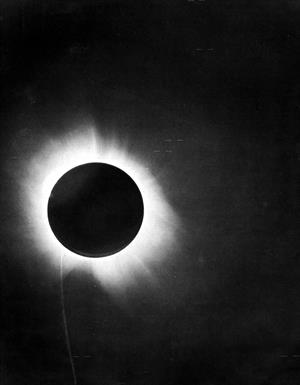
Einstein’s prediction of a solar eclipse in 1919*
Albert Einstein received the Nobel Prize in Physics in \(1921\). The Nobel Prize was given in honour of Alfred Nobel, a well-known Swedish scientist. It was established in the year \(1895\). The first Nobel Prize was granted in \(1901\). Later Einstein was honoured and was invited to various places all over the world. Also, he was praised by the press.
Albert Einstein received the Nobel Prize in Physics in \(1921\). The Nobel Prize was given in honour of Alfred Nobel, a well-known Swedish scientist. It was established in the year \(1895\). The first Nobel Prize was granted in \(1901\). Later Einstein was honoured and was invited to various places all over the world. Also, he was praised by the press.
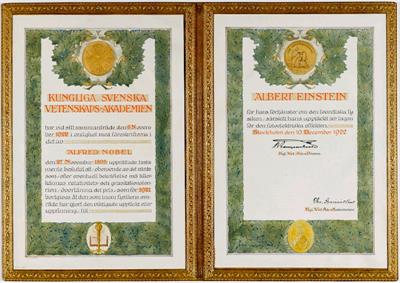
Einstein’s Nobel Prize for Physics*
When the National Socialist Party member, led by Adolf Hitler, came to power in Germany in \(1933\), Einstein left Germany and relocated to the United States of America. After five years, the Germans discovered nuclear fission. The reaction in which the nucleus of an atom separates into two or more smaller nuclei is known as Nuclear fission. The discovery of nuclear fission was carried out in Berlin. Due to this, all the scientists in America were upset and scared. The reason behind the fear was that the Germans might misuse the technology by manufacturing an atomic bomb. Many of them, including Einstein, feared for their life because they had to run away from Germany (homeland) due to Fascism. Fascism is a political system where the state or country is controlled by a powerful leader who rarely accepts any political disagreement.
After noticing the problem, a colleague spoke about it with Albert Einstein. As a result of his advice, he wrote a letter to Franklin D. Roosevelt, the American President. The letter was written on \(2\) nd August \(1939\). The message stated if one of these bombs exploded near any port, the areas and the nearby lands would be destroyed entirely. Einstein's letter had made an effect on Franklin D. Roosevelt. The Americans then began secretly developing the atomic bomb. Finally, they dropped it on two cities in Japan: Hiroshima and Nagasaki, in August \(1945\).
After noticing the problem, a colleague spoke about it with Albert Einstein. As a result of his advice, he wrote a letter to Franklin D. Roosevelt, the American President. The letter was written on \(2\) nd August \(1939\). The message stated if one of these bombs exploded near any port, the areas and the nearby lands would be destroyed entirely. Einstein's letter had made an effect on Franklin D. Roosevelt. The Americans then began secretly developing the atomic bomb. Finally, they dropped it on two cities in Japan: Hiroshima and Nagasaki, in August \(1945\).

Atom bomb nuclear explosion*
Einstein was shocked by seeing the vast destruction. Later, Einstein penned an official letter to the United Nations. Albert Einstein advocated the formation of a world government, but the letter had no effect. However, over the next decade, Einstein became increasingly involved in politics, advocating for an end to the manufacturing and usage of weapons. Also, he fought for international peace and democracy, and his principal goals were world peace and human liberty. When Albert Einstein died in \(1955\) at the age of \(76\), the world hailed him as a visionary and global citizen, as much as they had celebrated him as a scientist.
Einstein was shocked by seeing the vast destruction. Later, Einstein penned an official letter to the United Nations. Albert Einstein advocated the formation of a world government, but the letter had no effect. However, over the next decade, Einstein became increasingly involved in politics, advocating for an end to the manufacturing and usage of weapons. Also, he fought for international peace and democracy, and his principal goals were world peace and human liberty. When Albert Einstein died in \(1955\) at the age of \(76\), the world hailed him as a visionary and global citizen, as much as they had celebrated him as a scientist.
Reference:
National Council of Educational Research and Training (2006). Beehive. A Truly Beautiful Thing (pp. 46-53). Published at the Publication Division by the Secretary, National Council of Educational Research and Training, Sri Aurobindo Marg, New Delhi.
- Albert Einstein*: Unknown author, Public domain, via Wikimedia Commons.
- Hermann*: Unknown author, Public domain, via Wikimedia Commons.
- Pauline Koch Einstein*: Unknown author, Public domain, via Wikimedia Commons.
- Mileva Maric*: Unknown author, Public domain, via Wikimedia Commons.
- Einstein as a Technical Officer in a patent office*: Lucien Chavan / ETH Zürich, Public domain, via Wikimedia Commons.
- Einstein married Mileva Maric*: Unknown author, Public domain, via Wikimedia Commons.
- Albert and Elsa*: Agence Rol, Public domain, via Wikimedia Commons.
- Einstein's prediction of a solar eclipse in 1919*: Frank Watson Dyson, Public domain, via Wikimedia Commons.
- Einstein's Nobel Prize for Physics*: Unknown author, Public domain, via Wikimedia Commons.
- Atom bomb nuclear explosion*: Burnt Pineapple Productions, CC0, via Wikimedia Commons.
- *My Life Albert Einstein. New Delhi, General Press, 2018.
